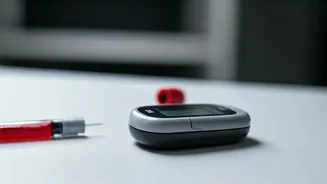The Dawn Phenomenon
The 'dawn phenomenon' is a primary reason for increased morning blood sugar. Around 2 a.m. to 8 a.m., the body naturally releases hormones such as cortisol,
glucagon, and growth hormone. These hormones work to provide energy for the upcoming day, causing the liver to release glucose into the bloodstream. In healthy individuals, the pancreas then produces enough insulin to manage the influx of glucose. However, for those with diabetes or insulin resistance, the body may not be able to effectively process this glucose, resulting in elevated blood sugar levels upon waking up. This is a common physiological process that affects many people, whether or not they have diabetes.
Insulin Resistance Role
Insulin resistance further exacerbates the issue. When cells become resistant to insulin, glucose cannot enter them easily. As a result, glucose accumulates in the bloodstream, leading to higher morning blood sugar readings. Several factors contribute to insulin resistance. These include a poor diet high in processed foods and added sugars, a sedentary lifestyle with little physical activity, and being overweight or obese. Chronic stress can also worsen insulin resistance by stimulating the release of cortisol, which interferes with insulin's action. Addressing insulin resistance is a key aspect of managing morning blood sugar spikes.
Dinner's Impact
The food consumed during dinner significantly impacts morning blood sugar levels. Eating a large meal, especially one rich in carbohydrates or fats, close to bedtime can lead to a spike in glucose levels overnight. The body takes longer to process these nutrients while sleeping, potentially contributing to elevated morning readings. Additionally, the type of carbohydrates consumed matters. Refined carbohydrates, such as white bread and sugary cereals, are quickly digested and can cause rapid spikes in blood sugar. Opting for a balanced dinner with a moderate portion of complex carbohydrates, lean protein, and healthy fats is better. Consuming dinner earlier in the evening and avoiding late-night snacking can also help maintain stable glucose levels.
Stress and Sleep
Stress and inadequate sleep can profoundly influence blood sugar control. Chronic stress triggers the release of stress hormones, which raise blood sugar levels. Poor sleep quality and quantity can also disrupt glucose metabolism, contributing to morning hyperglycemia. Sleep deprivation negatively impacts insulin sensitivity, making it harder for the body to regulate glucose. It is essential to manage stress through techniques such as yoga, meditation, or deep breathing exercises. Prioritizing 7-9 hours of quality sleep each night is also crucial. Establishing a regular sleep schedule and creating a relaxing bedtime routine can improve sleep quality and promote better blood sugar management. Regular exercise can also help to manage stress and improve sleep.
Medications and Illness
Certain medications and illnesses can contribute to increased morning blood sugar levels. Some medications, like steroids and some diuretics, can raise blood sugar as a side effect. It is important to discuss any medication-related concerns with a healthcare provider. Furthermore, during an illness, the body releases hormones to fight off the infection, which can lead to increased glucose production and insulin resistance. This can result in elevated blood sugar. Monitoring blood sugar levels more frequently during illness and adjusting medication or dietary habits under medical guidance is important. Staying hydrated and getting adequate rest during illness will also aid blood sugar management.
Lifestyle Adjustments
Several lifestyle adjustments can help manage morning blood sugar effectively. Regular exercise is one of the most effective strategies to improve insulin sensitivity and lower blood sugar levels. Aim for at least 150 minutes of moderate-intensity exercise or 75 minutes of vigorous-intensity exercise each week. Focusing on a balanced diet rich in whole foods, vegetables, fruits, lean proteins, and healthy fats is crucial. Limiting processed foods, sugary drinks, and refined carbohydrates is also very important. Regular blood sugar monitoring, especially in the morning, can help track progress and identify areas for improvement. Working with a healthcare provider or a registered dietitian to develop a personalized meal plan and exercise routine is also very helpful. They can provide tailored advice and support to achieve optimal blood sugar control.





















